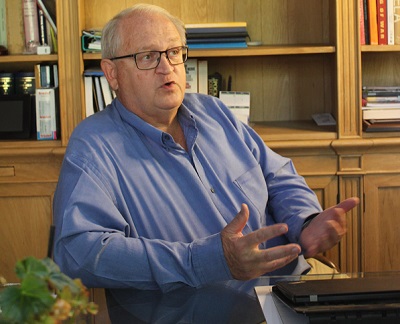

Director: Corporate-911
On 12 July, Reserve Bank Governor Lesetja Kganyago stated in the press that South Africa is facing the same “tricky” policy decisions that it was forced to make in the 1990s when South Africa was transitioning into a democracy. The difference now is that we are forced to make these decisions with failing institutions.
The plight of SAA has been well documented, as has the plight of Eskom, Transnet and the South African Post Office (SAPO). All these institutions must find their place in a world heavily influenced by forces far beyond their control and require a level of innovation and progressive business management that they have not had in the last decade.
Another SOE that is facing a similar Rubicon moment is the South African Broadcasting Corporation (SABC). Recent reports indicate that all is not well at the public broadcaster, which is a bad omen for all South Africans.
Inside insights
I served as the Chief Financial Officer of the SABC between 2002 to 2012. It was a turbulent ten years. I write this thought leadership editorial in support of the SABC as an organisation. It is the foundation of our democratic news dispensation and must serve all languages and cultures within South Africa. I am firmly committed to promoting a public services broadcaster.
To this end, the current leadership and previous Board have stabilised the organisation in the post-Hlaudi Motsoeneng era, have made inroads into addressing some of the broadcaster’s key challenges, and have achieved many notable milestones.
That being said, the briefing by the CFO to the Board has been leaked into the public domain. The new chair must stamp his authority on the Board. My experience with five different Boards is that leaks kill trust and disables change and progress.
To many friends and colleagues at the SABC who are again facing an existential crisis over the future of the broadcaster, this crisis is different and has a different tone and sense to it. Be bold and brave. There is a viable future; however, it is not one that is currently discernible in your strategy.
Leadership impasse
One of the most prominent root causes of financial distress is poor leadership.
On 18 April, President Cyril Ramaphosa finally elected a new SABC board six months after the term of the previous board ended. This was also not a priority for Ramaphosa, as it took legal action to force his hand into doing so. A big ship left leaderless will flounder. A critically illiquid business will fail.
The Presidency reported that, in terms of Section 13(3) of the Act, President Ramaphosa designated Khathutshelo Ramukumba as Chairperson of the SABC Board and Nomvuyiso Batyi as the Deputy Chairperson. Ramukumba is a chartered accountant by profession and is currently the Chief Financial Officer at the University of South Africa. He has a significantly challenging task ahead of him as financial instability is only one problem at the broadcaster.
In order to turn the SABC around, he will have to choose where to devote his time. The SABC is a large and difficult beast to direct. Unisa has its own not insignificant challenges in both operations and funding. The SABC needs focused leadership and will require significant political power and influence to get back on track. This turnaround will require significant leadership time and resources.
With the most significant election since 1994 looming, the SABC will find its resources directed to large scale election coverage and demands from all political groups. This tide is against a political solution to the financing of the SABC any time soon. In my experience, it becomes the political football of choice during the run-up to the elections.

Image By: Themba Makofane
Mismanagement
Mismanagement is another significant root cause of financial distress. There have been rumours linking the SABC to this for many years. However, a recent article by News 24 paints a worrisome picture.
The article points out that the SABC’s CFO recently revealed that the SABC is hampered by absent leadership with no sense of urgency in the executive team, is running on autopilot, and is once again barrelling towards day zero where it won’t be able to pay salaries. After mounting losses in the past decade, the SABC is set to record a massive financial loss of over R1 billion for its 2022/23 financial year, which has mushroomed from an estimated R608 million loss projected in December 2022.
The Board has released the previous CEO from his role and started a search for his replacement. The CFO is also in negotiations around her contract renewal or extension.
The article adds that by May (2023), the SABC had yet to pay Sentech – the parastatal signal distributor carrying the SABC’s various TV and radio signals – its monthly instalments for a year.
In addition, the Minister of Communications and Digital Technologies revealed that the SABC was owed over R44.2 billion in outstanding TV licence payments it will likely never recoup.
A different operating environment
Failure to adapt to a changing operating environment is another root cause of financial distress.
The SABC has always been a leader in the collection, aggregation, production and distribution of content and therefore has significant core technical competencies.
The key question is how the SABC will address the need for on-demand content and ubiquitous distribution. Digital terrestrial transmission will reduce the footprint of traditional television services, and the compact services of DSTV will further intercede between the SABC and its audiences. The SABC needs to become a ubiquitous distributor of content on a global scale serving many audiences and notably in the African Diaspora and all of its emigres.
Streaming services such as Netflix, Showmax, Disney+, and Amazon Prime have become popular additions in households where consumers were forced to work from home during the Covid Pandemic and needed reliable access to the internet to do so. They are indicative of a young urban audience with internet access.
Streaming services do not serve the real needs of an informed citizenry engaged in a democratic process. The public needs to know what is happening in the world around them; access to public services is a key part of the SABC mandate to inform its citizen audiences. No other broadcaster has this as its root cause for existence, and generally, social support programming is done by English talk stations. Deep rural audiences may be serviced by community stations; however, only the SABC carries news and content that educates and informs these already marginalised citizens.
Streaming services have done well by offering a comprehensive bouquet of entertainment, which is never repeated as it is on the SABC and DSTV, and the ability for consumers to personalise a watchlist of programmes they can consume as and when they want. Broadcasters do not dictate to them.
Given the content generation done by the SABC, and its stated objective of news channels in every language, it seems that the SABC needs to reconfigure its operating model to provide these services and use digital platforms like never before.
The other advantage of streaming services is that they are offered at a price point significantly lower than DSTV, which is currently the only paid broadcasting service in the country. Interestingly their price point is higher than a monthly TV licence subscription.

Image By: Supplied
Where to from here?
What are the next steps for the ailing broadcaster?
In order to deliver a sustainable business model, the public broadcaster needs to be reimagined.
One approach to take is to imagine what a new public broadcasting service will look like and then set about moving the SABC in that direction. The consequences will be a vibrant creative audience and content-centric service that appeals to the multitude of South Africans who are reflected in the voices and images broadcast by the SABC to millions of viewers and listeners.
Linear broadcasting channels will eventually come to an end; on-demand content will take precedence. News, education and other citizen-centric information will dominate but be delivered when required. The conflict of three channels and 11 languages will be effectively addressed.
This will lead to a reinvigorated content industry where space on SABC linear channels will no longer dominate scheduling decisions. This will open the space to more citizen involvement in content creation.
Important policy decisions need to be made about the SABC’s mission, vision and values. They cannot remain the same in a world that is significantly different from what it was five or ten years ago.
The SABC needs to take the opportunity to reinvigorate itself, and the local content industry needs to support the ecosystem that will create a sustainable public broadcasting service that will no longer be bound by the apartheid design set in the 1960s.
Robin Nicholson is the Director of Corporate-911 and is a Senior Business Rescue Practitioner.




